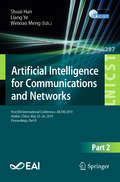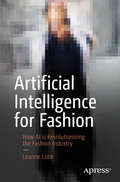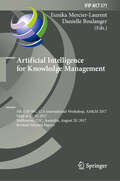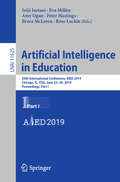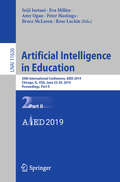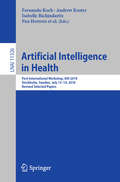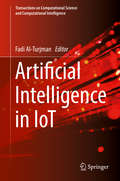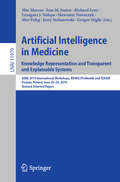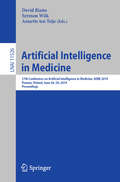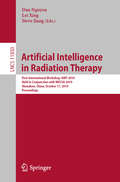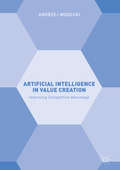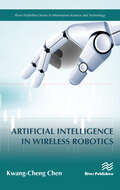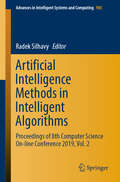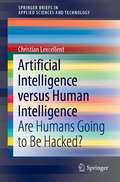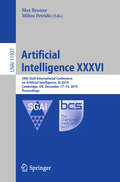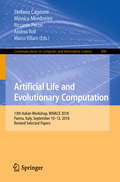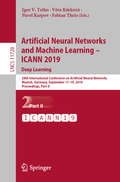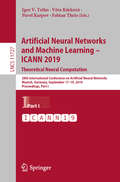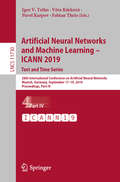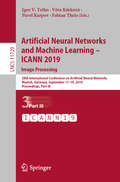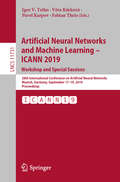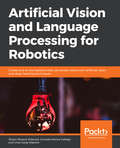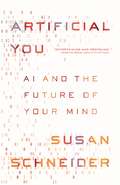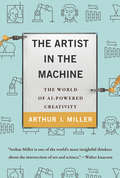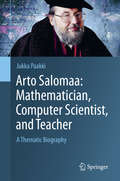- Table View
- List View
Artificial Intelligence for Communications and Networks: First EAI International Conference, AICON 2019, Harbin, China, May 25–26, 2019, Proceedings, Part II (Lecture Notes of the Institute for Computer Sciences, Social Informatics and Telecommunications Engineering #287)
by Shuai Han Liang Ye Weixiao MengThis two-volume set LNICST 286-287 constitutes the post-conference proceedings of the First EAI International Conference on Artificial Intelligence for Communications and Networks, AICON 2019, held in Harbin, China, in May 2019. The 93 full papers were carefully reviewed and selected from 152 submissions. The papers are organized in topical sections on artificial intelligence, mobile network, deep learning, machine learning, wireless communication, cognitive radio, internet of things, big data, communication system, pattern recognition, channel model, beamforming, signal processing, 5G, mobile management, resource management, wireless position.
Artificial Intelligence for Fashion: How AI is Revolutionizing the Fashion Industry
by Leanne LuceLearn how Artificial Intelligence (AI) is being applied in the fashion industry. With an application focused approach, this book provides real-world examples, breaks down technical jargon for non-technical readers, and provides an educational resource for fashion professionals. The book investigates the ways in which AI is impacting every part of the fashion value chain starting with product discovery and working backwards to manufacturing. Artificial Intelligence for Fashion walks you through concepts, such as connected retail, data mining, and artificially intelligent robotics. Each chapter contains an example of how AI is being applied in the fashion industry illustrated by one major technological theme. There are no equations, algorithms, or code. The technological explanations are cumulative so you'll discover more information about the inner workings of artificial intelligence in practical stages as the book progresses. What You’ll LearnGain a basic understanding of AI and how it is used in fashionUnderstand key terminology and concepts in AIReview the new competitive landscape of the fashion industryConceptualize and develop new ways to apply AI within the workplaceWho This Book Is ForFashion industry professionals from designers, managers, department heads, and executives can use this book to learn about how AI is impacting roles in every department and profession.
Artificial Intelligence for Knowledge Management: 5th IFIP WG 12.6 International Workshop, AI4KM 2017, Held at IJCAI 2017, Melbourne, VIC, Australia, August 20, 2017, Revised Selected Papers (IFIP Advances in Information and Communication Technology #571)
by Eunika Mercier-Laurent Danielle BoulangerThis book features a selection of extended papers presented at the 5th IFIP WG 12.6 International Workshop on Artificial Intelligence for Knowledge Management, AI4KM 2017, held in Melbourne, VIC, Australia, in August 2017, in the framework of the International Joint Conference on Artificial Intelligence, IJCAI 2017. The 11 revised and extended papers were carefully reviewed and selected for inclusion in this volume. They present new research and innovative aspects in the field of knowledge management such as machine learning, knowledge models, KM and Web, knowledge capturing and learning, and KM and AI intersections.
Artificial Intelligence in Education: 20th International Conference, AIED 2019, Chicago, IL, USA, June 25-29, 2019, Proceedings, Part I (Lecture Notes in Computer Science #11625)
by Seiji Isotani Eva Millán Amy Ogan Peter Hastings Bruce McLaren Rose LuckinThis two-volume set LNCS 11625 and 11626 constitutes the refereed proceedings of the 20th International Conference on Artificial Intelligence in Education, AIED 2019, held in Chicago, IL, USA, in June 2019. The 45 full papers presented together with 41 short, 10 doctoral consortium, 6 industry, and 10 workshop papers were carefully reviewed and selected from 177 submissions. AIED 2019 solicits empirical and theoretical papers particularly in the following lines of research and application: Intelligent and interactive technologies in an educational context; Modelling and representation; Models of teaching and learning; Learning contexts and informal learning; Evaluation; Innovative applications; Intelligent techniques to support disadvantaged schools and students, inequity and inequality in education.
Artificial Intelligence in Education: 20th International Conference, AIED 2019, Chicago, IL, USA, June 25-29, 2019, Proceedings, Part II (Lecture Notes in Computer Science #11626)
by Seiji Isotani Eva Millán Amy Ogan Peter Hastings Bruce McLaren Rose LuckinThis two-volume set LNCS 11625 and 11626 constitutes the refereed proceedings of the 20th International Conference on Artificial Intelligence in Education, AIED 2019, held in Chicago, IL, USA, in June 2019. The 45 full papers presented together with 41 short, 10 doctoral consortium, 6 industry, and 10 workshop papers were carefully reviewed and selected from 177 submissions. AIED 2019 solicits empirical and theoretical papers particularly in the following lines of research and application: Intelligent and interactive technologies in an educational context; Modelling and representation; Models of teaching and learning; Learning contexts and informal learning; Evaluation; Innovative applications; Intelligent techniques to support disadvantaged schools and students, inequity and inequality in education.
Artificial Intelligence in Health: First International Workshop, AIH 2018, Stockholm, Sweden, July 13-14, 2018, Revised Selected Papers (Lecture Notes in Computer Science #11326)
by Fernando Koch Andrew Koster David Riaño Sara Montagna Michael Schumacher Annette Ten Teije Christian Guttmann Manfred Reichert Isabelle Bichindaritz Pau Herrero Richard Lenz Beatriz López Cindy Marling Clare Martin Stefania Montani Nirmalie WiratungaThis book constitutes the refereed post-conference proceedings of the First International Workshop on Artificial Intelligence in Health, AIH 2018, in Stockholm, Sweden, in July 2018. This workshop consolidated the workshops CARE, KRH4C and AI4HC into a single event.The 18 revised full papers included in this volume were carefully selected from the 26 papers accepted for presentation out of 42 initial submissions. The papers present AI technologies with medical applications and are organized in three tracks: agents in healthcare; data science and decision systems in medicine; and knowledge management in healthcare.
Artificial Intelligence in IoT (Transactions on Computational Science and Computational Intelligence)
by Fadi Al-TurjmanThis book provides an insight into IoT intelligence in terms of applications and algorithmic challenges. The book is dedicated to addressing the major challenges in realizing the artificial intelligence in IoT-based applications including challenges that vary from cost and energy efficiency to availability to service quality in multidisciplinary fashion. The aim of this book is hence to focus on both the algorithmic and practical parts of the artificial intelligence approaches in IoT applications that are enabled and supported by wireless sensor networks and cellular networks. Targeted readers are from varying disciplines who are interested in implementing the smart planet/environments vision via intelligent wireless/wired enabling technologies.Includes the most up-to-date research and applications related to IoT artificial intelligence (AI);Provides new and innovative operational ideas regarding the IoT artificial intelligence that help advance the telecommunications industry;Presents AI challenges facing the IoT scientists and provides potential ways to solve them in critical daily life issues.
Artificial Intelligence in Medicine: AIME 2019 International Workshops, KR4HC/ProHealth and TEAAM, Poznan, Poland, June 26–29, 2019, Revised Selected Papers (Lecture Notes in Computer Science #11979)
by Mar Marcos Jose M. Juarez Richard Lenz Grzegorz J. Nalepa Slawomir Nowaczyk Mor Peleg Jerzy Stefanowski Gregor StiglicThis book constitutes revised selected papers from the AIME 2019 workshops KR4HC/ProHealth 2019, the Workshop on Knowledge Representation for Health Care and Process-Oriented Information Systems in Health Care, and TEAAM 2019, the Workshop on Transparent, Explainable and Affective AI in Medical Systems. The volume contains 5 full papers from KR4HC/ProHealth, which were selected out of 13 submissions. For TEAAM 8 papers out of 10 submissions were accepted for publication.
Artificial Intelligence in Medicine: 17th Conference on Artificial Intelligence in Medicine, AIME 2019, Poznan, Poland, June 26–29, 2019, Proceedings (Lecture Notes in Computer Science #11526)
by David Riaño Annette Ten Teije Szymon WilkThis book constitutes the refereed proceedings of the 17th Conference on Artificial Intelligence in Medicine, AIME 2019, held in Poznan, Poland, in June 2019. The 22 revised full and 31 short papers presented were carefully reviewed and selected from 134 submissions. The papers are organized in the following topical sections: deep learning; simulation; knowledge representation; probabilistic models; behavior monitoring; clustering, natural language processing, and decision support; feature selection; image processing; general machine learning; and unsupervised learning.
Artificial Intelligence in Radiation Therapy: First International Workshop, AIRT 2019, Held in Conjunction with MICCAI 2019, Shenzhen, China, October 17, 2019, Proceedings (Lecture Notes in Computer Science #11850)
by Dan Nguyen Lei Xing Steve JiangThis book constitutes the refereed proceedings of the First International Workshop on Connectomics in Artificial Intelligence in Radiation Therapy, AIRT 2019, held in conjunction with MICCAI 2019 in Shenzhen, China, in October 2019.The 20 full papers presented were carefully reviewed and selected from 24 submissions. The papers discuss the state of radiation therapy, the state of AI and related technologies, and hope to find a pathway to revolutionizing the field to ultimately improve cancer patient outcome and quality of life.
Artificial Intelligence in Value Creation: Improving Competitive Advantage
by Andrzej WodeckiThis book analyses various models of value creation in projects and businesses by applying different forms of Artificial Intelligence in their products and services. First presenting the main concepts and ideas behind AI, Wodecki assesses different models of technology-based value creation based upon the analysis of over 400 case studies. This framework shows how AI may influence both value creation and competitive advantage (efficiency, creativity and flexibility) within a modern organization. Finally, a conceptual model is formulated to evaluate AI-supported in-company projects and new ventures and identify the key managerial and technical competencies required.
Artificial Intelligence in Wireless Robotics (River Publishers Series In Information Science And Technology Ser.)
by Kwang-Cheng ChenRobots, autonomous vehicles, unmanned aerial vehicles, and smart factory, will significantly change human living style in digital society. Artificial Intelligence in Wireless Robotics introduces how wireless communications and networking technology enhances facilitation of artificial intelligence in robotics, which bridges basic multi-disciplinary knowledge among artificial intelligence, wireless communications, computing, and control in robotics. A unique aspect of the book is to introduce applying communication and signal processing techniques to enhance traditional artificial intelligence in robotics and multi-agent systems.The technical contents of this book include fundamental knowledge in robotics, cyber-physical systems, artificial intelligence, statistical decision and Markov decision process, reinforcement learning, state estimation, localization, computer vision and multi-modal data fusion, robot planning, multi-agent systems, networked multi-agent systems, security and robustness of networked robots, and ultra-reliable and low-latency machine-to-machine networking. Examples and exercises are provided for easy and effective comprehension.Engineers wishing to extend knowledge in the robotics, AI, and wireless communications, would be benefited from this book. In the meantime, the book is ready as a textbook for senior undergraduate students or first-year graduate students in electrical engineering, computer engineering, computer science, and general engineering students. The readers of this book shall have basic knowledge in undergraduate probability and linear algebra, and basic programming capability, in order to enjoy deep reading.
Artificial Intelligence Methods in Intelligent Algorithms: Proceedings of 8th Computer Science On-line Conference 2019, Vol. 2 (Advances in Intelligent Systems and Computing #985)
by Radek SilhavyThis book discusses the current trends in and applications of artificial intelligence research in intelligent systems. Including the proceedings of the Artificial Intelligence Methods in Intelligent Algorithms Section of the 8th Computer Science On-line Conference 2019 (CSOC 2019), held in April 2019, it features papers on neural networks algorithms, optimisation algorithms and real-world issues related to the application of artificial methods.
Artificial Intelligence versus Human Intelligence: Are Humans Going to Be Hacked? (SpringerBriefs in Applied Sciences and Technology)
by Christian LexcellentThis book showcases the fascinating but problematic relationship between human intelligence and artificial intelligence: AI is often discussed in the media, as if bodiless intelligence could exist, without a consciousness, without an unconscious, without thoughts. Using a wealth of anecdotes, data from academic literature, and original research, this short book examines in what circumstances robots can replace humans, and demonstrates that by operating beyond direct human control, strong artificial intelligence may pose serious problems, paving the way for all manner of extrapolations, for example implanting silicon chips in the brains of a privileged caste, and exposing the significant gap still present between the proponents of "singularity" and certain philosophers. With insights from mathematics, cognitive neuroscience and philosophy, it enables readers to understand and continue this open debate on AI, which presents concrete ethical problems for which meaningful answers are still in their infancy.
Artificial Intelligence XXXVI: 39th SGAI International Conference on Artificial Intelligence, AI 2019, Cambridge, UK, December 17–19, 2019, Proceedings (Lecture Notes in Computer Science #11927)
by Max Bramer Miltos PetridisThis book constitutes the proceedings of the 39th SGAI International Conference on Innovative Techniques and Applications of Artificial Intelligence, AI 2019, held in Cambridge, UK, in December 2019.The 29 full papers and 14 short papers presented in this volume were carefully reviewed and selected from 49 submissions. The volume includes technical papers presenting new and innovative developments in the field as well as application papers presenting innovative applications of AI techniques in a number of subject domains. The papers are organized in the following topical sections: machine learning; knowledge discovery and data mining; agents, knowledge acquisition and ontologies; medical applications; applications of evolutionary algorithms; machine learning for time series data; applications of machine learning; and knowledge acquisition.
Artificial Life and Evolutionary Computation: 13th Italian Workshop, WIVACE 2018, Parma, Italy, September 10–12, 2018, Revised Selected Papers (Communications in Computer and Information Science #900)
by Stefano Cagnoni Monica Mordonini Riccardo Pecori Andrea Roli Marco VillaniThis book constitutes the revised selected papers of the 13th Italian Workshop on Artificial Life and Evolutionary Computation, WIVACE 2018, held in Parma, Italy, in September 2018. The 12 full papers presented were thoroughly reviewed and selected from 30 submissions. They cover the following topics: Boolean networks and complex systems; economic, societal and technological applications; chemical, biological and medical applications. The chapter “Unveiling Latent Relations in the Photonics Techno-Economic Complex System” is open access under a CC BY 4.0 license at link.springer.com.
Artificial Neural Networks and Machine Learning – ICANN 2019: 28th International Conference on Artificial Neural Networks, Munich, Germany, September 17–19, 2019, Proceedings, Part II (Lecture Notes in Computer Science #11728)
by Igor V. Tetko Věra Kůrková Pavel Karpov Fabian TheisThe proceedings set LNCS 11727, 11728, 11729, 11730, and 11731 constitute the proceedings of the 28th International Conference on Artificial Neural Networks, ICANN 2019, held in Munich, Germany, in September 2019. The total of 277 full papers and 43 short papers presented in these proceedings was carefully reviewed and selected from 494 submissions. They were organized in 5 volumes focusing on theoretical neural computation; deep learning; image processing; text and time series; and workshop and special sessions.
Artificial Neural Networks and Machine Learning – ICANN 2019: 28th International Conference on Artificial Neural Networks, Munich, Germany, September 17–19, 2019, Proceedings, Part I (Lecture Notes in Computer Science #11727)
by Igor V. Tetko Věra Kůrková Pavel Karpov Fabian TheisThe proceedings set LNCS 11727, 11728, 11729, 11730, and 11731 constitute the proceedings of the 28th International Conference on Artificial Neural Networks, ICANN 2019, held in Munich, Germany, in September 2019. The total of 277 full papers and 43 short papers presented in these proceedings was carefully reviewed and selected from 494 submissions. They were organized in 5 volumes focusing on theoretical neural computation; deep learning; image processing; text and time series; and workshop and special sessions.
Artificial Neural Networks and Machine Learning – ICANN 2019: 28th International Conference on Artificial Neural Networks, Munich, Germany, September 17–19, 2019, Proceedings, Part IV (Lecture Notes in Computer Science #11730)
by Igor V. Tetko Věra Kůrková Pavel Karpov Fabian TheisThe proceedings set LNCS 11727, 11728, 11729, 11730, and 11731 constitute the proceedings of the 28th International Conference on Artificial Neural Networks, ICANN 2019, held in Munich, Germany, in September 2019. The total of 277 full papers and 43 short papers presented in these proceedings was carefully reviewed and selected from 494 submissions. They were organized in 5 volumes focusing on theoretical neural computation; deep learning; image processing; text and time series; and workshop and special sessions.
Artificial Neural Networks and Machine Learning – ICANN 2019: 28th International Conference on Artificial Neural Networks, Munich, Germany, September 17–19, 2019, Proceedings, Part III (Lecture Notes in Computer Science #11729)
by Igor V. Tetko Věra Kůrková Pavel Karpov Fabian TheisThe proceedings set LNCS 11727, 11728, 11729, 11730, and 11731 constitute the proceedings of the 28th International Conference on Artificial Neural Networks, ICANN 2019, held in Munich, Germany, in September 2019. The total of 277 full papers and 43 short papers presented in these proceedings was carefully reviewed and selected from 494 submissions. They were organized in 5 volumes focusing on theoretical neural computation; deep learning; image processing; text and time series; and workshop and special sessions.
Artificial Neural Networks and Machine Learning – ICANN 2019: 28th International Conference on Artificial Neural Networks, Munich, Germany, September 17–19, 2019, Proceedings (Lecture Notes in Computer Science #11731)
by Igor V. Tetko Věra Kůrková Pavel Karpov Fabian TheisThe proceedings set LNCS 11727, 11728, 11729, 11730, and 11731 constitute the proceedings of the 28th International Conference on Artificial Neural Networks, ICANN 2019, held in Munich, Germany, in September 2019. The total of 277 full papers and 43 short papers presented in these proceedings was carefully reviewed and selected from 494 submissions. They were organized in 5 volumes focusing on theoretical neural computation; deep learning; image processing; text and time series; and workshop and special sessions.
Artificial Vision and Language Processing for Robotics: Create end-to-end systems that can power robots with artificial vision and deep learning techniques
by Álvaro Morena Alberola Gonzalo Molina Gallego Unai Garay MaestreCreate end-to-end systems that can power robots with artificial vision and deep learning techniquesKey FeaturesStudy ROS, the main development framework for robotics, in detailLearn all about convolutional neural networks, recurrent neural networks, and roboticsCreate a chatbot to interact with the robotBook DescriptionArtificial Vision and Language Processing for Robotics begins by discussing the theory behind robots. You'll compare different methods used to work with robots and explore computer vision, its algorithms, and limits. You'll then learn how to control the robot with natural language processing commands. You'll study Word2Vec and GloVe embedding techniques, non-numeric data, recurrent neural network (RNNs), and their advanced models. You'll create a simple Word2Vec model with Keras, as well as build a convolutional neural network (CNN) and improve it with data augmentation and transfer learning. You'll study the ROS and build a conversational agent to manage your robot. You'll also integrate your agent with the ROS and convert an image to text and text to speech. You'll learn to build an object recognition system using a video.By the end of this book, you'll have the skills you need to build a functional application that can integrate with a ROS to extract useful information about your environment.What you will learnExplore the ROS and build a basic robotic systemUnderstand the architecture of neural networksIdentify conversation intents with NLP techniquesLearn and use the embedding with Word2Vec and GloVeBuild a basic CNN and improve it using generative modelsUse deep learning to implement artificial intelligence(AI)and object recognitionDevelop a simple object recognition system using CNNsIntegrate AI with ROS to enable your robot to recognize objectsWho this book is forArtificial Vision and Language Processing for Robotics is for robotics engineers who want to learn how to integrate computer vision and deep learning techniques to create complete robotic systems. It will prove beneficial to you if you have working knowledge of Python and a background in deep learning. Knowledge of the ROS is a plus.
Artificial You: AI and the Future of Your Mind
by Susan SchneiderA sober-minded philosophical exploration of what AI can and cannot achieveHumans may not be Earth’s most intelligent beings for much longer: the world champions of chess, Go, and Jeopardy! are now all AIs. Given the rapid pace of progress in AI, many predict that it could advance to human-level intelligence within the next several decades. From there, it could quickly outpace human intelligence. What do these developments mean for the future of the mind?In Artificial You, Susan Schneider says that it is inevitable that AI will take intelligence in new directions, but urges that it is up to us to carve out a sensible path forward. As AI technology turns inward, reshaping the brain, as well as outward, potentially creating machine minds, it is crucial to beware. Homo sapiens, as mind designers, will be playing with "tools" they do not understand how to use: the self, the mind, and consciousness. Schneider argues that an insufficient grasp of the nature of these entities could undermine the use of AI and brain enhancement technology, bringing about the demise or suffering of conscious beings. To flourish, we must grasp the philosophical issues lying beneath the algorithms.At the heart of her exploration is a sober-minded discussion of what AI can truly achieve: Can robots really be conscious? Can we merge with AI, as tech leaders like Elon Musk and Ray Kurzweil suggest? Is the mind just a program? Examining these thorny issues, Schneider proposes ways we can test for machine consciousness, questions whether consciousness is an unavoidable byproduct of sophisticated intelligence, and considers the overall dangers of creating machine minds.
The Artist in the Machine: The World of AI-Powered Creativity (The\mit Press Ser.)
by Arthur I. MillerAn authority on creativity introduces us to AI-powered computers that are creating art, literature, and music that may well surpass the creations of humans.Today's computers are composing music that sounds “more Bach than Bach,” turning photographs into paintings in the style of Van Gogh's Starry Night, and even writing screenplays. But are computers truly creative—or are they merely tools to be used by musicians, artists, and writers? In this book, Arthur I. Miller takes us on a tour of creativity in the age of machines. Miller, an authority on creativity, identifies the key factors essential to the creative process, from “the need for introspection” to “the ability to discover the key problem.” He talks to people on the cutting edge of artificial intelligence, encountering computers that mimic the brain and machines that have defeated champions in chess, Jeopardy!, and Go. In the central part of the book, Miller explores the riches of computer-created art, introducing us to artists and computer scientists who have, among much else, unleashed an artificial neural network to create a nightmarish, multi-eyed dog-cat; taught AI to imagine; developed a robot that paints; created algorithms for poetry; and produced the world's first computer-composed musical, Beyond the Fence, staged by Android Lloyd Webber and friends.But, Miller writes, in order to be truly creative, machines will need to step into the world. He probes the nature of consciousness and speaks to researchers trying to develop emotions and consciousness in computers. Miller argues that computers can already be as creative as humans—and someday will surpass us. But this is not a dystopian account; Miller celebrates the creative possibilities of artificial intelligence in art, music, and literature.
Arto Salomaa: A Thematic Biography
by Jukka PaakkiThis book outlines the scientific career of Arto Salomaa, a pioneer in theoretical computer science and mathematics. The author first interviewed the subject and his family and collaborators, and he then researched this fascinating biography of an intellectual who was key in the development of these fields.Early chapters progress chronologically from Academician Salomaa's origins, childhood, and education to his professional successes in science, teaching, and publishing. His most impactful direct research efforts have been in the areas of automata and formal languages. Beyond that he has influenced many more scientists and professionals through collaborations, teaching, and books on topics such as biocomputing and cryptography. The author offers insights into Finnish history, culture, and academia, while historians of computer science will appreciate the vignettes describing some of the people who have shaped the field from the 1950s to today. The author and his subject return throughout to underlying themes such as the importance of family and the value of longstanding collegial relationships, while the work and achievements are leavened with humor and references to interests such as music, sport, and the sauna.
